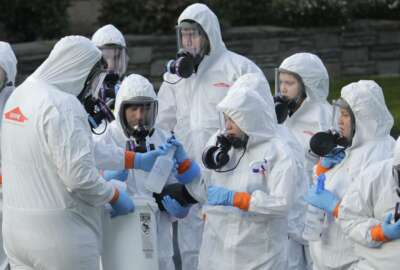To listen to the Federal Newscast on your phone or mobile device, subscribe in PodcastOne or Apple Podcasts. The best listening experience on desktop can be found using Chrome, Firefox or Safari.
- The top Democrat on the Senate Intelligence Committee is looking for assurances security clearances won’t be in jeopardy due to the coronavirus. Sen. Mark Warner (D-Va.) says COVID-19 may force some clearance holders to miss rent or mortgage payments if they’re forced to stay home and quarantine. That could raise red flags for security clearance holders and their credit scores. Warner says the Office of Personnel Management should release guidance on this topic. Agencies shouldn’t penalize clearance holders for financial challenges out of their control. (Sen. Mark Warner)
- Members of Congress are also worried about the coronavirus pandemic’s impact on veterans using the GI Bill. The concerns surround many universities’ recent decisions to move their courses online. Those actions could lead to a major reduction in GI bill payments as schools close their dormitories, because they’re tied to the housing costs students pay to their schools. Rep. Phil Roe (R-Tenn.) and Sen. Jerry Moran (R-Kansas) have both introduced legislation that would keep those housing allowances at current levels even as universities close their physical campuses. (Rep. Phil Roe)
- More agencies are launching, loosening or expanding telework requirements for employees as the coronavirus continues to spread. U.S. Citizenship and Immigration Services says it’s starting a remote work program. But the details so far are unclear. USCIS says it’ll launch the program based on collective bargaining with the American Federation of Government Employees. The Social Security Administration reinstated telework for regional and field offices near Seattle and White Plains, New York. Both regions are considered hot spots for the coronavirus. The Environmental Protection Agency announced voluntary, unscheduled telework options for New York City employees. (Federal News Network)
- There’s now a Senate companion for a bill designed to expand federal telework options. Maryland Sens. Ben Cardin (D-Md.) and Chris Van Hollen (D-Md.) introduced the Telework Metrics and Cost Savings Act. The bill would require agencies to set telework participation goals. Agencies would also have to regularly report on the cost savings. And they’d have to justify broad changes to existing telework policies to Congress. Virginia Reps. Gerry Connolly (D-Va.) and Jennifer Wexton (D-Va.) introduced a House companion last week. (Sen. Ben Cardin)
- While the government struggles with pandemic here on earth, NASA is having troubles getting into space. The inspector general discovered NASA program managers have ongoing struggles meeting cost and schedule goals for its Space Launch System, the heavy rocket for taking people to Mars. NASA had promised a first test launch this November, with an uncrewed capsule atop. The IG says NASA, at current spending rates, will bust cost promises by 43%. Program managers have already pushed the launch to spring of 2021 at the earliest. (NASA Office of the Inspector General)
- New standards should help agencies evaluate the effectiveness of their programs. As required under the Evidence-Based Policymaking Act, the Office of Management and Budget outlined program evaluation standards to make it easier for agencies to develop and implement evaluation activities, policies and in hiring and retaining qualified staff. The 30-page memo also offers examples for agencies to build evaluation capacity, develop policies and procedures to support evidence-based policymaking. OMB says the evaluation standards are flexible enough that each agency can decide which practices make the most sense given their individual needs. (White House)
- A bill to strengthen Homeland Security’s cyber branch made it through the Senate Homeland Security and Governmental Affairs Committee. The Cybersecurity Vulnerability Identification and Notification Act would give the Cybersecurity and Infrastructure Security Agency administrative subpoena power. That authority would require internet service providers to turn over contact information for entities that CISA identifies as having critical cyber vulnerabilities. The House Homeland Security Committee approved the bill in January. (Senate Homeland Security and Governmental Affairs)
- A bipartisan commission would restore two cyber oversight roles eliminated by the Trump administration. The Cyberspace Solarium Commission’s final report would stand up a national cyber director that reports directly to the president. It would also create a Bureau of Cyberspace Security and Emerging Technologies at the State Department, led by an assistant secretary. Former National Security Adviser John Bolton eliminated the White House cybersecurity coordinator role in 2018. That same year former Secretary of State Rex Tillerson folded his agency’s cyber coordinator role into the Bureau of Economic and Business Affairs. (Federal News Network)
- Ten new cybersecurity detail positions are open on USA Jobs. The Trump administration said the cyber details are designed to give current federal employees hands-on experience in the field. The Cybersecurity and Infrastructure Security Agency, Department of Veterans Affairs and the Environmental Protection Agency all have openings. The temporary positions are also open to Federal Cybersecurity Reskilling Academy graduates. Most positions are located in the Washington D.C. area or Durham, North Carolina. (Federal News Network)
- The Coast Guard is conducting a child care needs assessment across its force for active duty and civilian employees. The goal is to evaluate and understand the child care challenges facing families and determine the effectiveness of current programs and policies. The assessment comes after the Defense Department lowered active duty Coast Guard families’ priority for spots in DoD run child development centers. The service will meet with focus groups, do market analysis and conduct a web-based survey.
- The military is still struggling with providing enough child care for its service members, but there are new efforts on that front. The Navy said it will add 1,000 new child care positions this year and is budgeting for 4,000 new spaces next year. While the service is adding positions, the military as a whole is having trouble filling those spaces. The Defense Department’s leader for manpower and reserve affairs told lawmakers yesterday that DoD has 9,000 positions that are unfilled. The Navy, DoD and other services are forming private/public partnerships to try to help stem the child care shortage.
- An agreement has been reached between the American Postal Workers Union and the Postal Service that impacts more than 200,000 postal employees. The union contract includes a retroactive 2.4% pay raise, and an additional 1% increase this November. The contract also gives APWU members several cost-of-living adjustments, and converts 4,000 postal support employees to career status. A third-party arbitrator settled the impasse between APWU and the Postal Service after 20 months of negotiations. (American Postal Workers Union)
- Today is a big day for the Census Bureau as it begins the online portion of its 2020 count. The Census Bureau’s online response platform goes live today. The goal is to maximize the self-response through the secure web portal. Attri Kalluri, the senior advocate for Decennial Census Response Security and Data Integrity, said the online response platform is one of four innovations the bureau used to prepare for the 2020 count. Kalluri said Census began testing of the online response system annually starting in 2013 and continually improved the technology, architecture and security of the platform. Another one of those innovations is using Postal Service, state and local government and other data and GPS tools to reduce by two-thirds the number of people needed to confirm addresses in cities and towns. (Federal News Network)
Copyright
© 2024 Federal News Network. All rights reserved. This website is not intended for users located within the European Economic Area.



